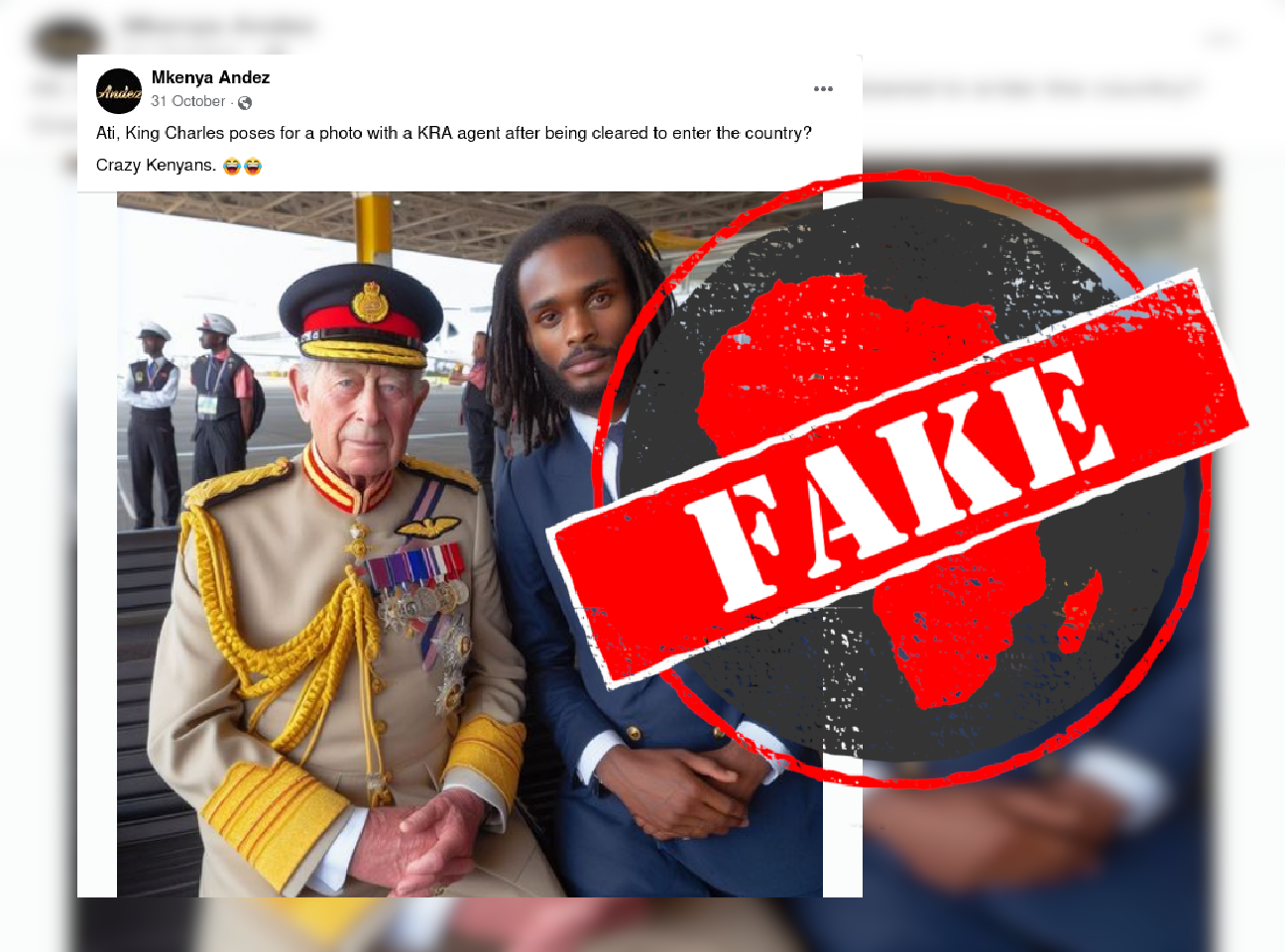IN SHORT: After a new tax and customs policy caused chaos at Nairobi’s international airport, an AI image of king Charles III with a man said to be a Kenyan customs agent started circulating on social media. The image was meant to be satire, but others have posted it as fact.
“King Charles poses for a photo with a KRA agent after being cleared to enter the country,” reads the caption of an image doing the rounds on social media in Kenya. KRA is the Kenya Revenue Authority, which collects taxes and customs duties.
The image shows what seems to be the UK’s king Charles III in a tan military uniform next to a man in a blue suit with a gold crown-topped badge on the jacket. An aircraft can be seen behind them.
It started circulating late November 2023, after KRA agents were accused of harassing passengers arriving at Jomo Kenyatta International Airport in Nairobi, Kenya’s capital.
This followed a new and unpopular policy that international visitors were to pay tax on personal items worth US$500 (about KSh75,000) or more.
Charles and his wife Camilla began a four-day state visit to Kenya, a former British colony, on 3 November.
But does the image really show Charles posing with a KRA agent “after being cleared to enter the country”?

Image generated using artificial intelligence
There are several signs that the image was generated with artificial intelligence (AI) software.
Charles and the agent seem oddly positioned. The background has a strange perspective. Charles and the agent’s faces are also unnaturally smooth. A look at recent photos of Charles show he has far more wrinkles, his face is not as long and his eyes are set further apart.
The monarch’s hands also appear distorted. Although the technology has quickly improved, AI struggles to accurately generate images of human hands.
Charles was wearing a suit, not a uniform, on the day he arrived in Kenya for the state visit. And the badge on the supposed KRA agent’s jacket is not used by the authority. Instead, it resembles an old Royal Irish officer’s headdress badge.
To be sure, Africa Check ran the image through an AI image detector. This gave a 85.44% likelihood that the image was AI generated. “This image is highly likely to be AI generated,” the detector concluded.
When satire becomes disinformation
The image was first posted, on 31 October, on the X account (formerly Twitter) of PostaMate, an openly satirical website. The site describes itself as the “home of satire and sarcasm” and its X description reads: “Factual, Verified and Timely News Satire.”
Satire can be defined as “the use of humour or exaggeration in order to show how foolish or wicked some people’s behaviour or ideas are”.
PostaMate clearly created the image and its caption to poke fun at the KRA and its controversial new policy.
But several social media users have reposted the image as if it were real, with no indication that it’s AI generated or acknowledgement of its satirical origins. When satire is presented as fact, it becomes disinformation.
The image is an AI-generated fake.
Republish our content for free
For publishers: what to do if your post is rated false
A fact-checker has rated your Facebook or Instagram post as “false”, “altered”, “partly false” or “missing context”. This could have serious consequences. What do you do?
Click on our guide for the steps you should follow.
Publishers guideAfrica Check teams up with Facebook
Africa Check is a partner in Meta's third-party fact-checking programme to help stop the spread of false information on social media.
The content we rate as “false” will be downgraded on Facebook and Instagram. This means fewer people will see it.
You can also help identify false information on Facebook. This guide explains how.


Add new comment